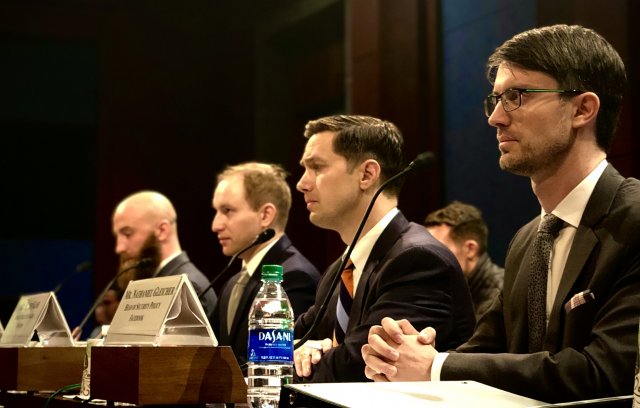
WASHINGTON — A veteran organization and the nation’s largest social media companies testified in a congressional hearing last week that imposters from foreign countries are using social media to exploit former service members.
Representatives from Facebook, Twitter and Vietnam Veterans of America testified before the Committee on Veterans’ Affairs to explain how foreign infiltrated social media exploits veterans and spreads misinformation while acknowledging what is currently being done to combat veteran identity theft.
This story was reported by Gaylord News, a Washington reporting project of the Gaylord College of Journalism and Mass Communication at the University of Oklahoma.
Imposters from Eastern Europe; especially Russia, Bulgaria and Ukraine are posing as the Vietnam Veterans of America organization on Facebook, Twitter, Google, Instagram and Reddit to sway the public with fake news and inflame national divisions with xenophobic messages.
“These Macedonians had staged a hostile takeover of two [Facebook] pages originally owned by real American veterans and then used them to build up xenophobic hatred against four women of color in Congress,” said Kristofer Goldsmith, the chief investigator and associate director of policy for Vietnam Veterans of America.
Since the beginning of the investigation, the organization has already found election interference related to the 2020 presidential campaign by these foreign entities. Vietnam Veterans of America, or VVA, has documented what they believe to be campaign finance fraud with well known Macedonian criminals who used followers from the Vets for Trump PACs Facebook page into sending political donations overseas via PayPal.
Separately, the veterans group discovered a number of foreign entities from eastern Europe and the Asian Pacific selling counterfeit merchandise featuring their trademark logo alongside racist, political propaganda.
Additionally, Nigerian scammers are using the names and photos of veterans to lure Americans into romance scams.
“Nigeria hosts a massive organized criminal empire,” said Goldsmith.
Some of the photos used by scammers are of soldiers who were killed in action. “Their gold star families are re-traumatized as their deceased loved ones continue to be used as bait for financial fraud,” he said.
The veterans group also completed an analysis of the Russian ads released by the House Permanent Select Committee on Intelligence circling on platforms such as Facebook. Among them were at least 113 ads directed at veterans, using them as props in Russia’s mission to divide Americans, said Goldsmith.
Facebook’s head of security policy, Nathaniel Gleicher, said that Facebook does not allow people to use fake accounts, artificially boost the popularity of content or impersonate someone else.
“We recognize however, that there are bad actors intent on misusing our platform and some of those bad actors target individuals and groups that are considered trustworthy, like veterans,” he said.
Gleicher said that Facebook sees foreign governments distort veterans issues. However, he said that this is less common than financially motivated fraud.
“Any amount of this type of deception is too much,” he said.
Currently, Gleicher said Facebook uses four components in efforts to stop inauthentic behavior. First, their investigators who hunt and remove sophisticated threats. Second, their technology programmed to detect and remove common threats. Third, their transparency and reporting tools intended to give users context about who they are following and communicating with. Fourth, working closely with civil society, researchers, governments and industry partners so issues can be flagged and eventually resolved.
Gleicher said, “Combining these four strategies allows us to pursue what we call adversarial design; continually adopting our platforms to make them more resistant to deception and more conducive to authenticity.”
On the other hand, Twitter’s public policy manager, Kevin Kane, said that they take a more holistic approach to dealing with fraudulent accounts.
Kane said that over the last year and a half, Twitter has found and challenged about 520 million accounts as a result of their investment in automated detection systems to look for coordinated networks.
“We want to massively disrupt these networks and not just focus on certain segments they seek to interfere with the conversation,” he said.
Although there are efforts established to combat fake accounts, U.S. Congressman and Chairman, Mark Takano (D-CA41), said that he is convinced that more can and must be done to protect veterans’ voices.
“More importantly, we need to understand what loopholes, roadblocks and barriers are needed and impeding a more effective enforcement and protections and perhaps identify an opportunity for legislative action to address any policy gaps,” he said.
Takano said that the integral piece of the solution to the problem lies with law enforcement. This led the committee to schedule a closed briefing for their members and staff with the FBI to learn how they and other law enforcement agencies are engaging with social media platforms.






















